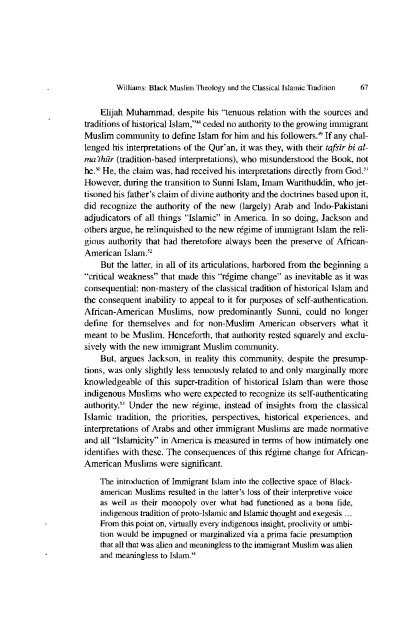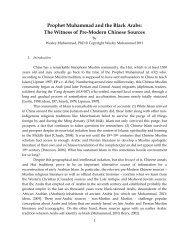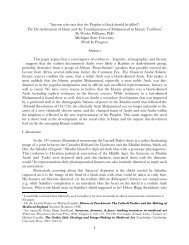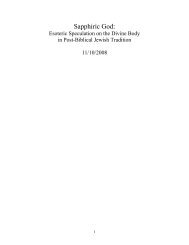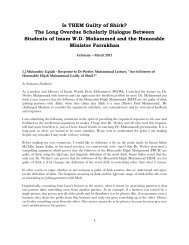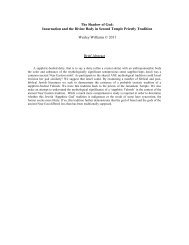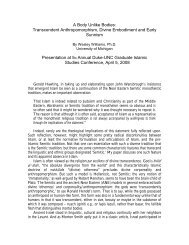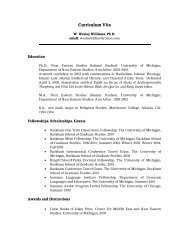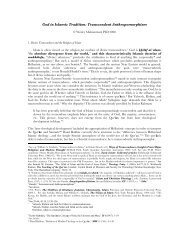Black Muslim Theology and the Classical Islamic Tradition ...
Black Muslim Theology and the Classical Islamic Tradition ...
Black Muslim Theology and the Classical Islamic Tradition ...
You also want an ePaper? Increase the reach of your titles
YUMPU automatically turns print PDFs into web optimized ePapers that Google loves.
Williams: <strong>Black</strong> <strong>Muslim</strong> <strong>Theology</strong> <strong>and</strong> <strong>the</strong> <strong>Classical</strong> <strong>Islamic</strong> TradItion 67<br />
Elijah Muhammad, despite his "tenuous relation with <strong>the</strong> sources <strong>and</strong><br />
traditions of historical Islam,""' ceded no authority to <strong>the</strong> growing immigrant<br />
<strong>Muslim</strong> community to detine Islam for him <strong>and</strong> his followers" If any challenged<br />
his interpretations of <strong>the</strong> Qur'an, it was <strong>the</strong>y, with <strong>the</strong>ir ta!sir bi alma'thOr<br />
(tradition-based interpretations), who ntisunderstood <strong>the</strong> Book, not<br />
he." He, <strong>the</strong> claim was, had received his interpretations directly from God."<br />
However, during <strong>the</strong> transition to Sunni Islam, Imam Warithuddin, who jettisoned<br />
his fa<strong>the</strong>r's claim ofdivine authority <strong>and</strong> <strong>the</strong> doctrines based upon it,<br />
did recognize <strong>the</strong> authority of <strong>the</strong> new (largely) Arab <strong>and</strong> Indo-Pakistani<br />
adjudicators of all things "<strong>Islamic</strong>" in America. In so doing, Jackson <strong>and</strong><br />
o<strong>the</strong>rs argue, he relinquished to <strong>the</strong> new regime of immigrant Islam <strong>the</strong> religious<br />
authority that had <strong>the</strong>retofore always been <strong>the</strong> preserve of African<br />
American Islam."<br />
But <strong>the</strong> latter, in all of its articulations, harbored from <strong>the</strong> beginning a<br />
"critical weakness" that made this "regime change" as inevitable as it wa"<br />
consequential: non-mastery of <strong>the</strong> c1assieal tradition ofhistorical Islam <strong>and</strong><br />
<strong>the</strong> consequent inability to appeal to it for purposes of self-au<strong>the</strong>ntication.<br />
African-American <strong>Muslim</strong>s, now predominantly Sunni, could no longer<br />
define for <strong>the</strong>mselves <strong>and</strong> for non-<strong>Muslim</strong> American observers what it<br />
meant to be <strong>Muslim</strong>. Heneeforth, that authority rested squarely <strong>and</strong> exclusively<br />
with <strong>the</strong> new immigrant <strong>Muslim</strong> community.<br />
But, argues Jackson, in reality this community, despite <strong>the</strong> presumptions,<br />
was only slightly less tenuously related to <strong>and</strong> only marginally more<br />
knowledgeable of this super-tradition of historical Islam than were those<br />
indigenous <strong>Muslim</strong>s who were expected to recognize its self-au<strong>the</strong>nticating<br />
authority." Under <strong>the</strong> new regime, instead of insights from <strong>the</strong> classical<br />
<strong>Islamic</strong> tradition, <strong>the</strong> priorities, perspectives, historical experiences, <strong>and</strong><br />
interpretations of Arabs <strong>and</strong> o<strong>the</strong>r immigrant <strong>Muslim</strong>s are made normative<br />
<strong>and</strong> all "<strong>Islamic</strong>ity" in America is measured in terms of how intimately one<br />
identiftes with <strong>the</strong>se. The consequences of this regime change for Afriean<br />
American <strong>Muslim</strong>s were signiticant.<br />
The introduction of Immigrant Islam into <strong>the</strong> coUective space of <strong>Black</strong>american<br />
<strong>Muslim</strong>s resulted in <strong>the</strong> latter's loss of <strong>the</strong>ir interpretive voice<br />
as well as <strong>the</strong>ir monopoly over what had functioned as • bona fide,<br />
indigenous tradition of proto-<strong>Islamic</strong> <strong>and</strong> <strong>Islamic</strong> thought <strong>and</strong> exegesis ...<br />
From this point on, virtually every indigenous insight, proclivity or ambition<br />
would he impugned or marginalized via a prima facie presumption<br />
that allth.t was alien <strong>and</strong> meaningless to <strong>the</strong> immigrant <strong>Muslim</strong> was alien<br />
<strong>and</strong> meaningless to Islam. ,4


